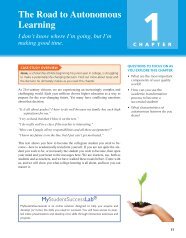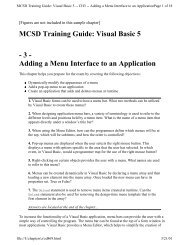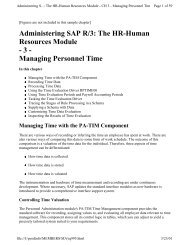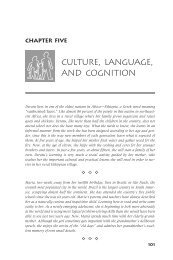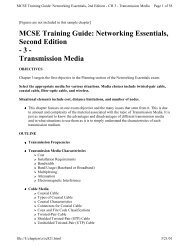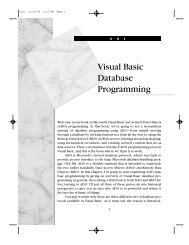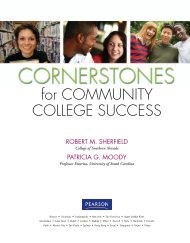SOCIAL PROBLEMS: A Down-to-Earth Approach, 8/e
SOCIAL PROBLEMS: A Down-to-Earth Approach, 8/e
SOCIAL PROBLEMS: A Down-to-Earth Approach, 8/e
You also want an ePaper? Increase the reach of your titles
YUMPU automatically turns print PDFs into web optimized ePapers that Google loves.
Sociologists often combine these methods. For example, in her study of the abortion<br />
clinic Luker used three of these methods: observation, interviews, and documents. Not<br />
only did she observe women and abortion providers in the clinic, but she also interviewed<br />
women who were having abortions, and she examined the clinic’s records on its patients.<br />
STRIVING FOR ACCURACY AND OBJECTIVITY. When doing research, it is essential <strong>to</strong> strive<br />
for objectivity. You must be on guard against producing biased data. For example, it is<br />
obvious that if you were <strong>to</strong> ask a woman “What is your opinion about killing babies by<br />
abortion?” your study would be biased in an antiabortion direction. No one—whether<br />
proabortion or antiabortion—favors killing babies. This sort of question would not constitute<br />
scientific research. Nor would this question, which would bias answers in the other<br />
direction: “What is your opinion on forcing a woman <strong>to</strong> have a baby when she wants an<br />
abortion?”<br />
You can see, then, that scientific studies require objectivity. Compare the biased questions<br />
that I just mentioned with these. Here is a neutral closed-ended question: “Do you<br />
favor or oppose abortion?” Here is a neutral open-ended question: “What is your opinion<br />
about abortion?” For either of these questions, you might specify the trimester being considered.<br />
Can you see that these questions are neutral, that they don’t tilt answers in any<br />
direction? If you ask questions like these, your own opinions about abortion, whatever<br />
they might be, will not interfere with your research.<br />
Like everyone else, those of us who are sociologists get our ideas and opinions from<br />
the groups with which we associate and the ideas <strong>to</strong> which we are exposed. No matter<br />
how we dislike it, this means that we have biases. Fortunately, we have a safeguard that<br />
helps <strong>to</strong> prevent our biases from contaminating our research on social problems. This<br />
is the publication of our findings. In our articles and books, we include details on the<br />
methods we use. Other sociologists examine these publications in detail, eager <strong>to</strong> point<br />
out any flaws they can find, including bias.<br />
To help you better understand how sociologists do their research, I asked several researchers<br />
<strong>to</strong> share their experiences with us. The result is a feature in this text called Spotlight<br />
on Social Research. For an overview of this feature, see the box on the next page.<br />
Should Sociologists Take Sides?<br />
THE PROBLEM OF DETERMINING MORALITY. These research methods allow us <strong>to</strong> gather objective<br />
information on social problems, but they do not reveal what attitude or social policy<br />
is “correct.” This takes us back <strong>to</strong> the issue I mentioned earlier, that of sociology not having<br />
the capacity <strong>to</strong> specify that one value is superior <strong>to</strong> another. Abortion, for example, is interwoven<br />
with thorny philosophical and religious issues concerning “great questions”: life,<br />
death, morality, freedom, responsibility, and ultimate existence. Sociologists can study people’s<br />
ideas about such <strong>to</strong>pics, but sociology has no way <strong>to</strong> judge whether those ideas are right<br />
or wrong, much less <strong>to</strong> determine the ultimate meaning that may underlie such issues.<br />
To take a position on a social problem is <strong>to</strong> take sides—and because sociology is not<br />
equipped <strong>to</strong> make judgments about values and morality, sociology cannot tell us what side<br />
<strong>to</strong> take. Even so, the question of taking sides on social problems is debated hotly among<br />
sociologists, for, like other thoughtful people, sociologists have their own concerns and<br />
ideas about social problems.<br />
The issue is clear-cut. Should sociologists, because they are scientists, forget their own<br />
subjective concerns and strive <strong>to</strong> remain dispassionate, detached, and value-free? If so, they<br />
would merely report the facts and not take sides on the social issues that affect our society.<br />
Or should they use their professional authority <strong>to</strong> promote the side of an issue that they<br />
see as right? For example, should they try <strong>to</strong> help the “oppressed,” the “down and out,”<br />
the poor, and others who are on the receiving end of social problems?<br />
THE DEBATE AMONG SOCIOLOGISTS. Those who champion neutrality stress the position<br />
that sociologists enjoy no superior vantage point from which <strong>to</strong> make moral judgments.<br />
Sociologists do have knowledge and skills <strong>to</strong> offer, they say, but not morality. In their study<br />
of social problems, sociologists can indicate the potential consequences of different social<br />
20 CHAPTER 1 HOW SOCIOLOGISTS VIEW <strong>SOCIAL</strong> <strong>PROBLEMS</strong>: THE ABORTION DILEMMA



